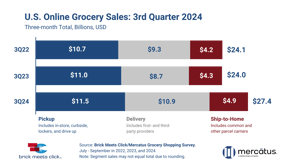Interest Grows for Healthy Fast Food
NEW YORK It may seem counterintuitive, but because of health concerns, many women are talking about snack and fast-food brands, according to a six-month data analysis of The Women at NBC Universal's monthly Brand Power index. Over the July to December 2010 period, NBCU found that some of the biggest gainers in the index which measures online search data and online and in-person dialogue by women about
February 7, 2011
JENNA TELESCA
NEW YORK — It may seem counterintuitive, but because of health concerns, many women are talking about snack and fast-food brands, according to a six-month data analysis of The Women at NBC Universal's monthly Brand Power index.
Over the July to December 2010 period, NBCU found that some of the biggest gainers in the index — which measures online search data and online and in-person dialogue by women about the top 500 brands — were snack and fast-food brands that had recently offered promotions for healthier food.
Melissa Lavigne-Delville, vice president of trends and strategic insights for women at NBCU, thinks the convenience of healthier options attracts women who are concerned about their health, but don't necessarily have a lot of time to spare on healthy meal preparation.
“As people right now in particular are making their New Year's resolutions, hearing all this news about the obesity epidemic in America, how it's impacting them, how it's impacting the next generations, it's great that all of a sudden health has been sort of served up to them in a much easier format,” said Lavigne-Delville. “And I think that is what is giving it the buzz.”
Wal-Mart Stores, which held the No. 1 spot on the index over the six-month period, has made marketing health and sustainability a focus, including most recently, its initiative to reduce salt and sugar in its packaged foods, develop a front-of-pack seal, and eliminate partially hydrogenated fats and oils.
Additionally, McDonald's moved 10 spots to 14th, which NBCU attributes to McDonald's partnership with Farmville, aligning the brand with fresh farm produce. This January, McDonald's continued to promote healthier alternatives with the launch of its oatmeal with fruit, offered all day.
So why are women talking about these brands as opposed to traditional health and wellness brands? Darren Tristano, executive vice president at Technomic, a Chicago food industry consultant, said a lot of it has to do with these brands' advertising dollars and advertising campaigns' effectiveness. “They seem to be targeting snacking occasions as an opportunity for smaller portions, which translates into better for you, which in the perception of many, including women, it would be a healthier alternative,” he said.
Despite smaller portions, retailers are able to keep the same and premium prices for these products, so promoting portion control can provide an opportunity to save retailers costs, he said.
Health concepts are often technical, but women have been “buzzing” about brands that rely on a strategy Lavigne-Delville calls “intuitively good.” She said the more brands promote foods that are healthy in an uncomplicated way, like salads, natural, simple and fresh ingredients, the better the response from women.
Another brand that moved up the index is Domino's Pizza. After the retailer's campaign promoting California farm fresh tomatoes and real cheese in its pizza, Domino's moved up 140 spots to No. 218 in just one month. Wendy's moved to 96th, following the introduction of new salads and natural-cut sea salt fries.
Consumers report they do a better job eating healthy at home, but eat around half of their meals away from home, said Tristano. “They know they can eat healthier at home, so they're looking to indulge when they go out. As a result, you know they're not necessarily looking for healthy, but for the convenience factor of being able to find specific items that are convenient when you need something to eat,” he said. “That's where these smaller potions and better-quality items are a better value and a greater appeal.”
Lavigne-Delville said not all food retailer movement on the index can be attributed to healthier food campaigns. NBCU also saw “a little bit of a bump” in women talking about family-friendly restaurants, such as Outback Steakhouse and Applebee's.
Pharmacies are also prominent on the list, with Walgreens at 43rd, CVS at 60th and Rite Aid at 113th.
Target had the second spot in the index, which NBCU attributes to the retailer's marketing. “Target's standout quality is its social media presence — I would say their marketing presence in general,” Lavigne-Delville, noting that the average percentage of “buzz” coming from social media for big-box retailers is 38%, but for Target it is 52%.
Chains are anticipating the mandated menu nutritional disclosures coming up this year, Tristano told SN. “They're proactively adapting their menus to have more appealing, lower-calorie, better, healthier options,” he said.
Tristano anticipates this trend of consumers looking for healthier fast-food options will continue for the next couple years, following the nutritional disclosure on menus, but — like ads on websites — consumers may begin to ignore the nutritional information.
“Over time, consumers are going to have an immediate push back, likely look at different alternatives when they're purchasing because of the nutritional disclosure, but ultimately go back to what they were normally eating before,” Tristano said.
About the Author
You May Also Like






